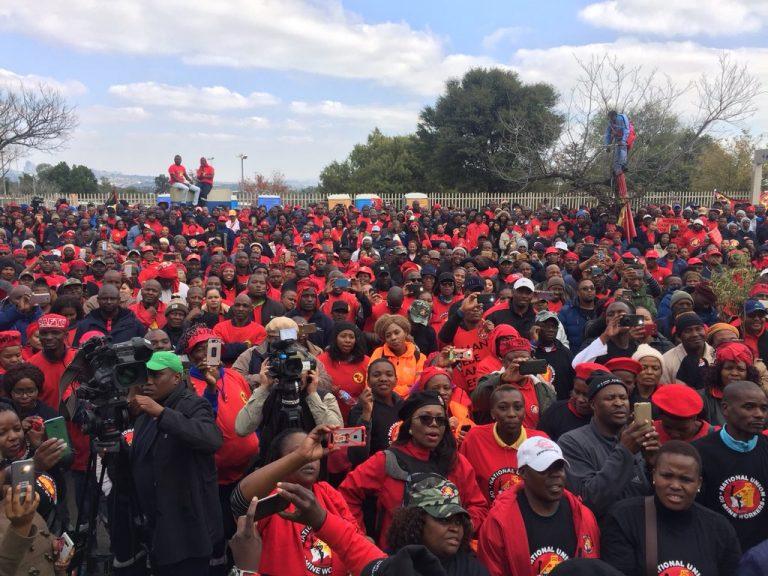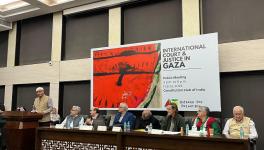Unions at South Africa’s Eskom demand Wage Hike, Reject ‘Insulting’ 0% Rise

The trade unions, National Union of Metalworkers of South Africa (NUMSA), National Union of Mineworkers (NUM) and Solidarity, on June 19 have restarted the talks with the South African national electricity provider Eskom regarding the wage increase issue. The unions on Tuesday said that wage negotiations through the Central Bargaining Forum began began after the power company proposed a four-year wage deal with a guaranteed increase based on inflation. The company, according to the press statement by the unions, have offered “an a 4.7% rise for the year 2018 and an inflation based increase every year thereafter for the next four years”.
The NUMSA said that the unions have are debating on the offer and will give a joint response in the morning to Eskom management during the second day of the negotiations on Wednesday.
Earlier on Thursday last week, workers at the Eskom protested against an ‘insulting’ 0% wage increase by organising pickets all over the country at eskom power plants. Members of gathered in large numbers outside the company’s Megawatt Park in Johannesburg.
The two unions have demanded a flat 15% salary increase for all its employees. Some of their other demands are a R2000 housing allowance hike, the banning of labour brokers and an end to the outsourcing of cleaner and security guards job vacancies.
The workers also demanded a six months paid maternity leave and one month paid paternity leave.
Earlier, Phakamile Hlubi-Majola, the national spokesperson for NUMSA told The Dawn Newsthat they will be entering wage talks with Eskom on Tuesday and that they remain hopeful of making progress. If the talks fail, they will be embarking on a dispute resolution process through CCMA. If mediation through the CCMA(Commission for Conciliation‚ Mediation and Arbitration), the labour dispute body, also fails, then they will apply to go on strike legally.
In a joint statement, NUMSA and NUM said, “the government had introduced an austerity budget that was accompanied by VAT and fuel price increases while Eskom decided to deny workers their well-deserved pay raise.”
The statement also said, “Eskom management and the Eskom board demonstrated that they do not care about workers or their families.”
According to the reports, Eskom alleged that it is implementing power outages throughout Thursday because of “the protest action”. NUMSA, in a statement rejected the allegations by Eskom that its members were contributing to the load-shedding with sabotage.
“How do we know that the executives at Eskom are not responsible for sabotaging their own network?” Numsa spokesperson Phakamile Hlubi-Majola said.
“They have a vested interest in portraying our members as violent savages‚ when in fact‚ they are simply expressing their democratic right to protest and are fighting for a living wage for their families,” she added.
The Labour Court had issued an injunction against the protesting unions and restrain them any further planned strikes‚ pickets‚ gatherings or marches. NUMSA and NUM are also going to challenge the court order since they believe it is the right of every worker to protest, according to Majola.
SAFTU Rejects Public Services Agreement
In another development, South African Federation of Trade Unions (SAFTU) had earlier rejected the wage agreement signed between the major unions and the government, pointing out that it will not make any major contribution to improving the living standards of public servants. SAFTU-affiliated unions organised a strike action on June 11 against the agreement. The federation of unions is also planning a road show in the coming months to take its message to workers all over the country and explain how this agreements in not in their best interests.
SAFTU has noted that the agreement signed by unions affiliated to the Congress of South African Trade Unions (COSATU) is worse than the previous accord for the period 2014-2017. It has asked its constituent unions of public servants to reject the agreement.
COSATU, affiliated with the ruling African National Congress and representing a big chunk of the 1.3 million teachers, police officers and nurses, signed the wage deal which lasts for the next three years. This wage deal increases workers’ salaries by up to seven percent in the first year, and of up to projected inflation rates plus one percent in the second and third years.
According to SAFTU, the 2014 agreement was also very unfavourable to workers. The agreement stipulated a wage increase of inflation plus 1% on top of that. The agreement also gave the authority of projecting inflation to the treasury department of the government. The 2014 agreement had also not made any changes to the housing allowance, which was kept at R900,00. It started giving out a housing subsidy for the meagre amount of R1200. The agreement had not made any improvements to the Government Employees Medical Aid Scheme (GEMS) and the Police Medical Aid Scheme.
The agreement reached for 2018 and lasting the next three years between the government and COSATU also grants the right to project inflation to the treasury. Official rates of inflation would always be lower than inflation faced by the workers since workers spend most of their income on travelling to and fro from work and on food.
This agreement also fails to take into account the 7% VAT increase, the 6-10% increase in the sin taxes, the increase in the fuel levy and the newly introduced sugar tax. There is also no contingency clause in the agreement in case the official inflation rate is lower than what it actually turns out to be to adjust it in the following year’s projection.
The new agreement has also delayed the implementation of the de-linking of the employee from spouse to 1st September 2018 for employees on salary level 1-15 and to 1st september 2019 for the rest. The agreement also made compulsory the GEMS as the sole service provider to all public servants even though it is not cheaper than other medical aid schemes. SAFTU has stated that they want equalisation of subsidy to all public servants regardless of which public aid schemes they have opted for. SAFTU also demands that GEMS must not be made compulsory for public servants.
The Government has also not addressed other concerns of workers but instead have relegated them to the status of “minor issues”. These include the employee initiated severance package, wherein the Government made a presentation indicating the need for retrenchment in the public service. According to the government, COSATU and FEDUSA had agreed to the government’s terms. This could effectively mean the retrenchment of thousands of workers.
Other issues include the austerity measures introduced by the government after the 2008 world economic crisis, the government’s policy of offloading 25,000 jobs through natural attrition (all those who die or leave the public service) by not finding replacements for workers.
Get the latest reports & analysis with people's perspective on Protests, movements & deep analytical videos, discussions of the current affairs in your Telegram app. Subscribe to NewsClick's Telegram channel & get Real-Time updates on stories, as they get published on our website.
























